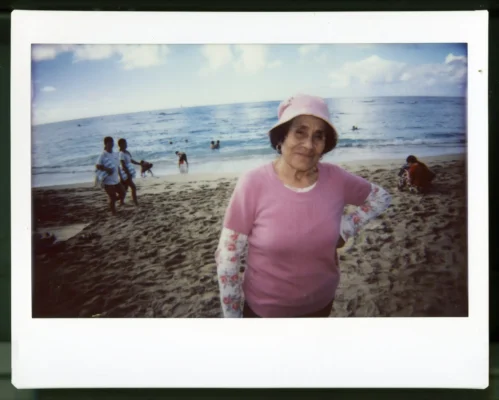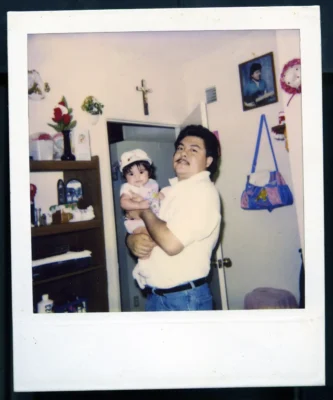Curanderos in my household are known as healers. My family opened me up to people with this gift. It wasn’t until I became older that I realized the concept wasn’t as familiar to the world around me.
Throughout my life, curanderos were mainly people you went to when western medicine was not helpful. My understanding of western medicine consists of pills, x-rays, and a fear of the unknown. With curanderos, their healing consists of herbal medicine, ancient techniques, and massages that heal you almost instantly. My tatarabuela (great grandmother), was a very famous curandera in her village of Los Sauces, Guerrero, Mexico. People would travel to see her and would ask to be healed by her. This lineage of curanderismo was passed down to her daughter, my great aunt, who then taught me some healing qualities of curanderismo. As I have continued to understand the knowledge and techniques of curanderismo, it has become deeply connected to who I am. A gift of healing, a beautiful secret known in my community by few, but with the hope of it being known by many.

My Great Aunt Gregoria would say “My mom had a don; it was not something she studied. Whenever we were injured, she would heal us.”
In Spanish, a don is referred to as a gift but it can be understood in many different ways. In this case, it’s the gift of being a curandero. My family members told me that it is something you are born into. Usually, when someone was at their most vulnerable, they would end up in the garage of a stranger and, through that stranger’s don, they would be healed. When I was young, my dad said curanderos are born different from everyone else. They see the world and feel it much differently and having that natural born ability to heal people is their journey in life.

Over the years I became curious about where curanderos came from and, moreover, the relationship people have with them and with religion. Being raised in a traditional Catholic household, my family advised me to steer clear of certain things. In my home, my parents always warned me to stay away from witchcraft, cults, and anything that was deemed suspicious or that could conflict with the Catholic faith. Yet, in my hometown, people always spoke of someone being healed by a curandera or there would be stories shared of someone being sick and it being impossible for the person to be healed. A curandero would always be a saving grace for them.
It made me curious as to why there was this sense of duality and hypocrisy in saying you need to be committed to your faith, but if something goes wrong, go to a witch doctor.
“The Catholic faith does not believe in curanderismo. When they go to a priest and say: ‘I have an incurable disease, do you think I am being cursed?’ Priests say: ‘It’s not true, come to church and then you will be healed.’ So, no, I do not think it ties to Catholicism,” said my dad.
Due to how he was raised, my dad keeps curanderismo and Catholicism separate. But growing up, my mom was a Catholic who only believed in curanderismo when it seemed to serve the people she loved. As I grew up, I began to notice a connection between curanderismo and Catholics throughout the years because of many people who believe in healers and in their Catholic faith.
“People in my village knew that my mom was a holy woman because she had a shrine dedicated to the Virgin Mary and people trusted her and allowed themselves to be healed by her,” said my aunt.
I saw this as a lingering desire to have a deeper connection with the faith that was had before Catholicism. I began to question if this duality was an exception because my family had difficulty assimilating to Catholic culture without letting go of their traditional values. It is still a conversation that we as a family have for hours on end at times because it still impacts us with how we view the world and other people.
“There is a good quantity of curanderos that are bad. The good ones charge you a little bit or just ask for a donation. There are also curanderos that are bad because they take advantage of innocent people with back and head pain. They ask for huge sums of money that people pay, and they do not help. Charlatans who only want to take advantage of others,” said my dad.
But there are many positive testimonies that have influenced my understanding of this gift. It has strengthened my connection to my culture, my personal gifts, the personal responsibility I have to those I heal and to those who are misinformed about the beauty of this gift. I have heard these stories throughout the years that attest to the many miracles of curanderismo.
“[My mom] had very bad heart pain and she couldn’t handle the pain sometimes and we would take her to hospitals to get CT scans and nothing would help,” said my dad. “Someone told her to go to a curandera and the woman did an herb and egg cleanse. When the egg cracked, a sharp needle came out. There were five other witnesses that saw this. I’m not sure how she did it, but after we left my mom had energy to eat, cook, walk and run. It was a true miracle, and it made me happy to see my mom like that.”
When my dad shared this story with me, it shocked me. It made me feel like this world that we live in that seems to be “reality” really isn’t. There are miracles that happen every day and my grandma was one of many that experienced it. I also felt saddened that my grandma had so much pain and no one was able to help her. I resonated with her because I have been in that position before. It makes me more grateful to be lucky knowing about curanderos.
Another story I was told about curanderos was my aunt’s story about her cousin
“My cousin Juan was hit by a car and left for dead in the streets,” said my aunt. “A woman from the village told me…that the driver was intentionally trying to kill him. They took him to the hospital but…because his foot was too broken, they left his foot hanging. I barged into the hospital and told them to let him go…I took him to my mom and told her to heal him. My mom knew about this remedy that entailed an ointment made with egg, honey, and salt. She would mix it and put it in a soft cloth over the broken foot. Then, he was healed. After a few weeks he was out playing soccer. I was so shocked that he was out playing, but he lived! He is still alive to this day, and it brings me so much joy!”
All these stories have given me an insight into how they lived their lives in Mexico, something still foreign to me. They were born in a place with not much technology or education. They only relied on their family and their communities to teach them how to live. I grew up with television, school, and books, but stories like these always helped me feel closer to understanding the lives of my family members. It also taught me the power of community and relying on one another.
I feel these dualities exist because in my family’s hometowns, you grow up helping one another, understanding each other. Then to leave that all behind and emigrate to a foreign country where you are forced to be self-sufficient and independent is an unimaginable change that signifies a major shift in the way of life that they have been accustomed to. On the other hand, I can only imagine the comfort and safety once finding a community in this new country of curanderos and those who believed in their healing gifts.
I believe these dualities exist because there was a lack of formal education. The only sense of learning is through word of mouth, once you are introduced to new ways of thinking, you begin to question what to believe and what not to believe. Thinking becomes an exploration, a choice. This is important to me because I had to make choices as an adolescent and well into adulthood, whether I realized it or not. Choices to believe what the school system taught me. Choices of what I learned through books, movies and through my family’s stories. I decided to believe in my Catholic faith and also in the beauty of curanderos. To witness this healing, this gift given to people and the way they choose to use it for good, is truly magical. It is also important to me because this is not something that is talked about anywhere. I only hear about this through family or friends. It is not written anywhere, which is why I speak about it as a secret. With this article, I can give it a voice.
Brenda was a fellow in the 2024 Story Gathering Sandbox, a program that gives young writers the opportunity to publish an article for our news outlet, Voices.

Be a part of our movement to share and celebrate the diverse stories of our ethnic communities
Our Northwest cultural communities have powerful stories to tell. Your support can help us amplify these voices. Donate $5 or $10 today and follow us to stay connected with the latest updates.